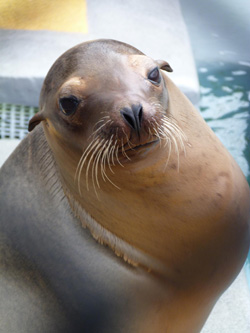
California sea lion Nikkimaddie was released in August 2015 at Point Reyes National Seashore after being treated for domoic acid toxicity at the Marine Mammal Center. --Courtesy of The Marine Mammal Center
Trouble is brewing out west for sea lions. A new study shows that California sea lions exposed to a toxin produced by a certain type of algae have permanent brain damage that spurs memory loss and behavioral changes, which could affect the animals' ability to survive in the wild and have negative implications for the seafood industry.
A team led by researchers at the University of California, Santa Cruz, examined 30 California sea lions that were undergoing veterinary care and rehabilitation, and used brain imaging (MRI) to see the extent of brain lesions caused by a toxin called domoic acid. The scientists also gave the sea lions behavioral tests to evaluate their spatial memory.
Researchers found that sea lions with hippocampal lesions caused by domoic acid poisoning performed poorly on short and long-term spatial memory tasks. The findings could explain why some animals have trouble finding food and stray from their normal range, drifting either too far out at sea or inland far from the coast, Colleen Reichmuth, co-author on the study and director of the Pinniped Cognition and Sensory Systems Laboratory at UC Santa Cruz, said in a statement. Scientists published their study in a recent issue of Science.
The team also looked at how domoic acid exposure affected certain brain networks in sea lions. Domoic acid binds to and damages receptors in the hippocampus--an area of the brain involved in memory--often causing lesions and producing short and long-term memory loss in animals. Scientists saw that sea lions with symptoms of toxic exposure had reduced connectivity between the hippocampus and the thalamus, a pathway that helps rodents and humans form memories of events or experiences.
"This is the first evidence of changes to brain networks in exposed sea lions, and suggests that these animals may be suffering a broad disruption of memory, not just spatial memory deficits," Peter Cook, first author on the study, said in a statement. "Sea lions navigate a complex and changing environment, and if their spatial memory is impaired it's bound to affect their ability to survive in the wild."
The findings also come as bad news for the seafood industry, which is already dealing with the adverse effects of domoic acid poisoning. This year, California closed anchovy, sardine, Dungeness, rock crab, mussel, clam and oyster fisheries in the state after domoic acid contamination surfaced, said Raphael Kudela, a professor of ocean sciences at UC Santa Cruz who wasn't involved with the recent study, in an interview with Newsweek. "This is starting to drive the smaller businesses out of the market, and we're also losing millions of dollars in tourism for places like Washington State where recreational harvesting of razor clams is part of the culture," Kudela said.
- get the study abstract
- read the statement
- here's the Newsweek story